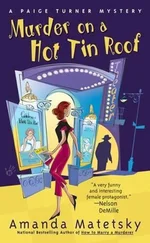I looked at my plate. “Oooh.”
Lightly sautéed sea scallops lay over a heap of white beans. The white beans were atop a mound of steamed fresh spinach leaves. The whole thing was topped with a scattering of chopped red tomatoes. It was a red, white, and green dish, sort of an Italian flag of food.
Michael nodded modestly. “New idea. Try it.”
I already knew before I took a bite that I’d love it. Anything Michael makes is delicious, and this was downright soul-stirring. The white beans were flavored with garlic and something else that raised them above ordinary white beans, the scallops were delicately sweet and tender, and the spinach and tomatoes made everything else sit up and take notice. I tried not to make a pig of myself, but I had two helpings, plus two hunks of hot bread with butter.
My idea of heaven is a place where people who love one another gather for good food and good conversation, so I was in heaven. It’s good to be able to recognize those heavenly moments, good to be inwardly grateful to be so lucky.
We didn’t speak about Laura. Instead, we talked about how much better traffic was now that most of the snowbirds had gone home. Paco told us about a procession of bikini-clad young women on spring break following a line of slow-crossing Mottled Ducks that had stopped traffic on Ocean Avenue that morning, and how nobody in the line of cars had objected to the wait—some because they liked the bikinis and some because they liked the ducks. I said lots of bright cheery things too, the way women do to avoid topics they don’t want to talk about. And Michael and Paco nodded and smiled, the way men do when they really aren’t listening to a word you say, but they love you and don’t want you to guess they’re thinking about carburetors or football scores or whatever it is that men think about.
After Todd and Christy died, especially in that terrible first year, the only person I told my feelings to was a shrink I went to for a while. I never told Michael and Paco that I wanted to die as well. I never let them hear me rail about the half-blind old man who had run into my husband and child in the parking lot. I never told them how I despised the state for allowing people to renew their driver’s license without a visual exam, how furious I was at God for allowing my husband and baby to be taken from me. Michael and Paco had been almost as devastated as I was. Dumping all my emotions on them would have made them feel even worse.
The problem with only telling the good happy stuff is that all the bad, scary, sad stuff that doesn’t get told ferments and grows like underground mold, and you never know when it may reach its nasty fingers up and grab you by the throat.
After dinner I helped them clean the kitchen and then told them good night. No matter how shocked I was over Laura’s murder, I still had to post my pet visits for the day. I finished entering all the information a little before nine o’clock and was halfway through undressing for bed when the phone rang. I let the machine answer.
A crisp woman’s voice said, “Ms. Hemingway, this is Ruth Avery at the Bayfront Village Nursing Unit. Cora Mathers asked me to call and let you know she’s a patient here.”
I did a one-legged hop for the phone, but she had hung up. In a breathless rush, I pulled on jeans and a less saggy T-shirt and charged downstairs.
Cora Mathers is the grandmother of a former client who got herself murdered while I was taking care of her cat, and she’s become very dear to me. She lives in a posh apartment her granddaughter bought her at Bayfront Village, one of Sarasota’s best retirement communities. The thought that she was in Bayfront’s nursing unit pushed my heart into my throat.
Outside the nursing unit at Bayfront, I careened into the parking lot and practically jumped out of the Bronco before it came to a stop. A smattering of cars in the parking lot said visiting hours weren’t over yet, but I knew I didn’t have much time. A pleasant-faced woman at the reception desk seemed to brace herself as she watched me barrel into the lobby.
I said, “I’m here to see Cora Mathers. And don’t tell me I can’t see her, because I’ll raise such a stink you can’t believe.”
The woman turned to peck keys on a computer keyboard and peer at a screen.
Mildly, she said, “She’s in Room Two-oh-four.”
I gave her a curt nod, probably the way Genghis Khan acknowledged people who stepped out of his way when he was trampling over the countryside, and took the stairs instead of the elevator. I didn’t have time to wait for an elevator.
I didn’t have to look for Room 204. It was directly across the hall from the stairwell, and the door was open. An old sitcom from the seventies was blaring from a small TV on a movable metal contraption at the foot of the first hospital bed, where a woman with drug-glazed eyes was lying flat on her back looking at the screen.
Hurrying around a curtain separating her bed from the next one, I found Cora sitting in an easy chair. She had one foot propped on a stool and was looking out the window at pale spots of sailboats on the darkened bay. Soaking wet, Cora might weigh eighty pounds, and she’s roughly the height of an average sixth-grade child. Except for an exasperated look on her face, she looked normal—which is to say she looked frail and old, but healthy.
When my grandmother was Cora’s age—closer to ninety than eighty—she went beach walking every day, read everything published, and seriously considered taking up wind surfing. Cora, on the other hand, is the kind of woman who peaks at fifteen, is matronly at forty, and old at sixty. Age doesn’t have anything to do with how many times the earth has revolved around the sun since one’s birth, it’s about health and being protected. If circumstances had been different, Cora might have ended up as robust as my grandmother, but she started out living hand-to-mouth and scared. Now she’s living high on the hog and lonely. In either case, she has faced reality without losing her faith in goodness, which I consider a major life accomplishment.
When she saw me, she threw both arms out wide and grinned. “Well, hallelujah and pass the biscuits! I’ve been waiting for you all this damn day.”
I leaned to hug her slight shoulders. “I didn’t know you were here. What happened?”
“Oh, it’s the silliest thing. I slipped in the bathroom last night and twisted my ankle a little bit, and nothing would do them but I had to come over here and spend the night. Now they won’t let me go home until the swelling goes down. It’s plain stupid, is what it is, so I told them to call you.”
She was trying for anger, but I could see fear in her eyes. When a resident of a retirement community is no longer able to live alone, they are routinely moved to the facility’s nursing wing, and their apartment is sold. Every old person fears they’ll be unfairly railroaded into a nursing unit while they’re still capable of living alone.
I knelt beside the stool to look at her ankle. It was a little puffy but not bruised. I poked it with a tentative finger, and Cora flinched.
I said, “They feed you okay in here?”
She brightened. “I had bacon and eggs for breakfast.”
“No kidding. Real bacon or pulverized turkey skin?”
“Real pork. And real biscuits too. Lunch wasn’t bad either, and for dinner I had chicken and dumplings.”
Personally, I never have understood the appeal of boiled chicken with pieces of dough dropped on it, but I made enthusiastic noises before I bent over her bedside table to make sure her water carafe was filled.
I said, “I guess they can afford to go all out when they know you’ll just be here a day or two.”
She looked thoughtful. “That’s true. I don’t think they feed the really sick people that good.” She pointed toward the curtain and lowered her voice. “She’s sick as a dog, and all she got for breakfast was cream of wheat.”
Читать дальше












